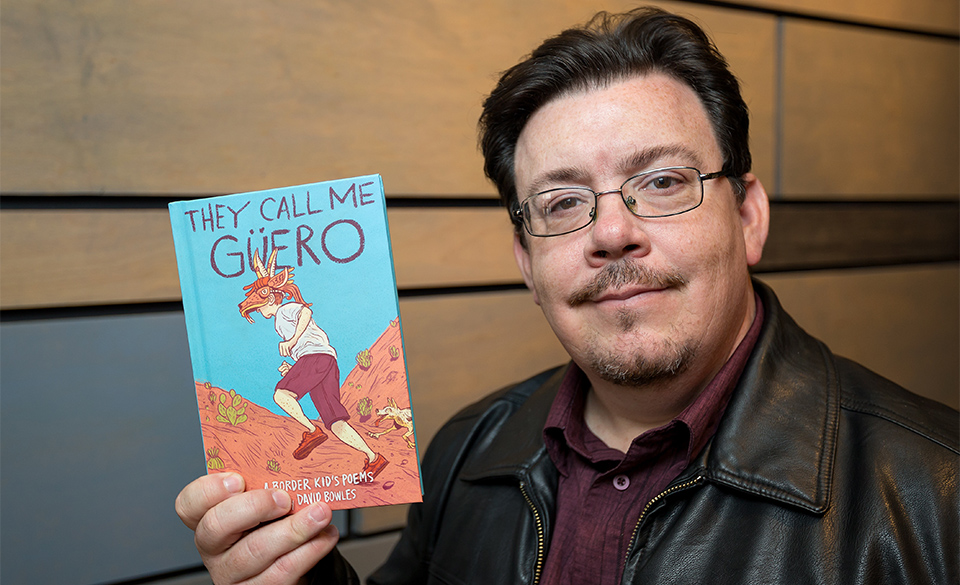By Priscilla Ramirez
RIO GRANDE VALLEY, TEXAS – Spanish-speakers often refer to a person with light hair, eyes and complexion as “güero” – a term of endearment free of cultural or racial overtones.
Now, he bestows it on the protagonist of his newest book, “They Call Me Güero,” a novel in verse filled with slice-of-life poems that illustrate life as a border kid – something 430,000 children in the Valley can relate to.
“Young kids have to realize that we have wonderful things to celebrate and we should feel pride in it,” Bowles said. “We are worthy of being written about and our lives contain poetry. We need to look in the mirror and see we are beautiful.”
Children should be able to read a different perspective in lives like their own, he says. His book tackles the issue of single-faceted archetypes, especially machismo (exaggerated masculinity) forced onto Latino boys, and comes up often during his visits to schools across the Valley.
“I tell students it’s OK to be travieso (mischievous), it doesn’t make you a bad person,” he said. “I want to give boys permission to be as complex as they want to be. Güero is more of a soft boy – he’s not a fighter. His girlfriend does the fighting for him, and that’s OK, too. There’s nothing wrong with admiring strong women and seeing them as role models.”
In preparation for writing Güero’s voice, Bowles pulled from his family experiences growing up in the Valley and molded it with his son’s life. The result blends the English and Spanish languages with a blend of regional traditions and modern ideals.
The focus was not in teaching a moral lesson, but to paint a picture of everyday life in the Valley. Each poem is a vignette into the culture and acts as homage to the uniqueness of the Rio Grande Valley, especially the importance of family and friends.
“Bringing all these elements from my own family into tighter focus helped me to appreciate my love for my family,” Bowles said. “Once you get to a certain age, you lose people, and writing about a young boy helps me remember them and hear their voices more clearly. It was like revisiting my own childhood.”
Bowles believes that tackling an important issue like cultural identity is essential in today’s climate. His passion for positive recognition for the Valley and the expression of Hispanic culture were his love letter to South Texas.
“People on the outside look at Mexican-Americans and don’t understand us or our culture and are afraid of it,” he said. “I want a book about us to be in the hands of kids, so they understand what it’s like to be a Mexican-American kid and see how wonderful it is.”
“They Call Me Güero” recently was awarded a 2019 Tomas Rivera Book Award, but that’s not the first acknowledgment for the book. Bowles, and “Güero,” have earned multiple accolades recently for excellence in poetry:
- Pura Belpré Author Honor Book.
- 2019 Walter Dean Myers Awards for Outstanding Children’s Literature.
- School Library Journal 2018 Best Books List Honor, Middle Grade.
- National Council of Teachers of English Notable Verse Novel for Children 3-13.
- ALSC Notable Children's Book, 2019.
- Shelf Awareness 2018 Best Children's & Teen Books of the Year, Middle Grade.
As a literature professor, Bowles believes that works for children can also be beneficial to adults, as a refresher to a more innocent way of thinking and encourages adults to enjoy younger readers.
“It’s nice to win awards, but what I really want is for people to read it and to understand, and to look up to Güero as someone who greets the world with open arms,” Bowles said. “We have misconceptions about what literature is and divorce ourselves from the wide-eyed and clear-headed way of looking at the world.”
CATCH BOWLES AT FESTIBA 2019
On Tuesday, Feb. 26, Bowles will serve as a presenter at UTRGV’s annual FESTIBA(Festival of International Books and Arts), where he will speak on “Güeros and Chupacabras: Helping Kids Celebrate the Border.”
You can check out his session at 2 p.m. on the Edinburg Campus, at the Health Affairs West Building, Room 2.212.
A remote viewing on the Brownsville Campus will be held at the Life and Health Sciences Building, Room 1.104.
ABOUT UTRGV
The University of Texas Rio Grande Valley (UTRGV) was created by the Texas Legislature in 2013 as the first major public university of the 21st century in Texas. This transformative initiative provided the opportunity to expand educational opportunities in the Rio Grande Valley, including a new School of Medicine and a School of Podiatry, and made it possible for residents of the region to benefit from the Permanent University Fund – a public endowment contributing support to the University of Texas System and other institutions.
UTRGV has campuses and off-campus research and teaching sites throughout the Rio Grande Valley including Brownsville (formerly The University of Texas at Brownsville campus), Edinburg (formerly The University of Texas-Pan American campus), Harlingen, Weslaco, McAllen, Port Isabel, Rio Grande City and South Padre Island. UTRGV, a comprehensive academic institution, enrolled its first class in the fall of 2015; the School of Medicine welcomed its first class in the summer of 2016, and the School of Podiatric Medicine in the fall of 2022.

